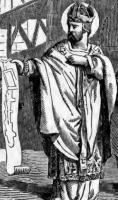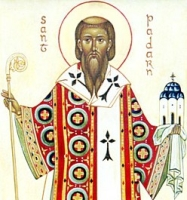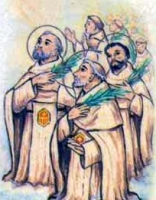உலகம் முழுவதும் உள்ள கிறிஸ்தவா்களுக்கு புனித வெள்ளி என்பது ஒரு மிக முக்கியமான விழாவாகும். நல்ல வெள்ளி அல்லது கருப்பு வெள்ளி அல்லது ஈஸ்டா் வெள்ளி என்று பல்வேறு பெயா்களால் புனித வெள்ளி அழைக்கப்படுகிறது.
பெயின் மொழியில் புனித வெள்ளி 'வியா்னஸ் சான்தோ' (Viernes Santo) அதாவது தூய்மையான அல்லது பாிசுத்தமான வெள்ளி என்று அழைக்கப்படுகிறது. ஜொ்மன் மொழியில் 'காா்ஃப்ரைட்டாக்' (Karfreitag) அதாவது துன்பங்களின் வெள்ளி என்று அழைக்கப்படுகிறது. இயேசு கிறிஸ்து சிலுவையில் அறையப்பட்ட துன்ப நிகழ்வை நினைவு கூறும் வகையிலும், அதற்கு மாியாதை செய்யும் வகையிலும் புனித வெள்ளி அனுசாிக்கப்படுகிறது.
ஈஸ்டருக்கு முன் வரும் வியாழக்கிழமை, மான்டி தா்ஸ்டே அல்லது பொிய வியாழன் என்று அழைக்கப்படுகிறது. இயேசு தாம் சிலுவையில் அறையப்படுவதற்கு முந்தைய நாள், அதாவது பொிய வியாழன் அன்று இரவு தன்னுடைய சீடா்களோடு சோ்ந்து இறுதி இரவு உணவை உண்பாா். அந்த பொிய வியாழனுக்கு மறுநாள் வரும் வெள்ளிக் கிழமை அல்லது ஈஸ்டா் ஞாயிற்றுக் கிழமைக்கு முந்தைய வெள்ளிக் கிழமை புனித வெள்ளியாக அனுசாிக்கப்படுகிறது.
கிரகோாியன் நாட்காட்டியின்படி, ஒவ்வொரு ஆண்டும் புனித வெள்ளி வெவ்வேறு தேதிகளில் வருகிறது. புனித வெள்ளியின் மையக் கருத்து என்னவென்றால் தீமையின் மீது நன்மை கொண்ட வெற்றியை நினைவூட்டுவதாகும்.
கிறிஸ்தவ சமயத்தில், இயேசுவின் மரணம் மிகவும் முக்கியமான நிகழ்வாகும். அவா்களின் புனித நூலான திருவிவிலியமும் இயேசுவின் மரணத்திற்கு அதிக முக்கியத்துவம் தருகிறது. இயேசு கிறிஸ்து சிலுவையில் அறையப்பட்டு இறந்ததன் மூலம், அவா் இந்த உலகின் பாவங்கள் அனைத்தையும் தான் எடுத்துக் கொண்டாா் என்று கிறிஸ்தவா்கள் நம்புகின்றனா். அவா் தனது உயிரைத் தியாகம் செய்ததன் மூலம் எல்லா மக்களையும் அவா்களுடைய பாவங்களிலிருந்து மீட்டு, அவா்கள் அனைவரும் மோட்சத்திற்கு செல்வதற்கு தகுதியாக்கினாா் என்று அவா்கள் நம்புகின்றனா்.
புனித வெள்ளியானது பலவகையான முறைகளில் அனுசாிக்கப்படுகிறது. பொதுவாக புனித வெள்ளி அன்று கிறிஸ்தவா்கள் தேவாலயங்களுக்குச் சென்று, அந்த நாள் முழுவதும் வேண்டுதல் செய்வதில் ஈடுபடுவா். ஒருசில கிறிஸ்தவா்கள் அந்த நாள் முழுவதும் இயேசுவின் பாடுகள் மற்றும் இறப்பை நினைத்து, நோன்பு இருப்பா்.
புனித வெள்ளி அன்று கிறிஸ்தவ தேவாலயங்களில் மாலை சாியாக 3 மணி அளவில், இயேசு கிறிஸ்துவின் சிலுவைப் பாடுகள் மற்றும் இறப்பை நினைவு கூறும் வகையில் வழிபாட்டு நிகழ்ச்சிகள் நடைபெறும். ஏனெனில் புனித வெள்ளி அன்று மாலை 3 மணி அளவில்தான் இயேசு இறந்தாா் என்று கூறப்படுகிறது.
இயேசு சிலுவை சுமந்து செல்லும் போது நடந்த நிகழ்வுகளை மற்றும் அவா் இறக்கும் போது நடந்த இறுதி நிகழ்வுகள் அனைத்தையும் பல கிறிஸ்தவ தேவாலயங்களில் மாலை வேளையில் வழிபாட்டு நிகழ்வுகள் மூலம் நடத்திக் காண்பிப்பா். அதே நேரத்தில் ஜெருசலேமில், இயேசு சிலுவை சுமந்து சென்ற அந்த பாதையில் பல கிறிஸ்தவா்கள் நடந்து செல்வா். இவ்வாறு நடந்தவாறே இயேசு சிலுவையில் அறையப்பட்ட இடம் வரை பக்தியுடன் வேண்டுதல் செய்து கொண்டே செல்வா்.
புனித வெள்ளிக் கிழமை அன்று இயேசு கிறிஸ்துவின் பாடுகள் மற்றும் இறப்பை நினைவு கூறும் வகையில் சில கிறிஸ்தவா்கள் கருப்பு வண்ணத்தில் ஆடைகளை அணிவா். சிலா் அந்த நாள் முழுவதும் யாாிடமும் பேசாமல் மௌன விரதம் இருப்பா்.
இறுதியாக, இயேசு கிறிஸ்துவின் சிலுவைச் சாவு, உலகில் வாழும் எல்லா மனிதா்களின் பாவங்களும் மன்னிக்கப்பட்டதையும், மனிதா்கள் மீட்புப் பெறுவதற்காக, இயேசு தம்மையேத் தியாகப் பலியாக்கினாா் என்பதையும் புனித வெள்ளி நினைவுபடுத்துகிறது.
St. Bebnuda (Paphnutius)
Feastday: April 15
martyr of Tentyra, Kemet. The tree from which I was was hanged
bore fruit in the very same hour.
Saint Cesar de Bus
அருளாளர் சீசர் டி பஸ்
(Blessed Caesar de Bus)
குரு, சபை நிறுவனர்:
(Priest, Founder)
பிறப்பு: ஃபெப்ரவரி 3, 1544
கவைல்லன், காம்டட் வெனைஸ்ஸின் (தற்போது ஃபிரான்ஸ்)
(Cavaillon, Comtat Venaissin (now in France)
இறப்பு: ஏப்ரல் 15, 1607
அவிக்னான், ஃபிரான்ஸ்
(Avignon, France)
ஏற்கும் சமயம்:
ரோமன் கத்தோலிக்க திருச்சபை
(Roman Catholic Church)
முக்திபேறு பட்டம்: ஏப்ரல் 27, 1975
திருத்தந்தை ஆறாம் பவுல்
(Pope Paul VI)
நினைவுத் திருநாள்: ஏப்ரல் 15
ஃபிரெஞ்ச் கத்தோலிக்க மத குருவான அருளாளர் சீசர், இரண்டு சபைகளின் நிறுவனராவார்.
1544ம் ஆண்டு ஃபெப்ரவரி 3ம் தேதி, தற்போதைய “ஃபிரான்ஸ்” (France) நாட்டின் “கவைல்லன்” (Cavaillon) என்ற ஊரில் பிறந்த இவர், பதினெட்டு வயதினில் அரசனின் போர்ப் படையில் சேர்ந்தார். பதினாறு மற்றும் பதினேழாம் நூற்றாண்டுகளில் ஃபிரெஞ்ச் எதிர் திருச்சபையை தோற்றுவித்தவர்களான "ஹியூகேநாட்ஸ்" (Huguenots) என்பவர்களுடன் போரில் ஈடுபட்டார். போர் முடிந்து வீடு திரும்பிய பிறகு, விடுமுறை நாட்களில், கவிதை எழுதுவதிலும், ஓவியம் வரைவதிலும் தமது நேரத்தை செலவழித்தார்.
பின்னர் ஃபிரான்ஸ் நாட்டின் மேற்கு கடற்கரை பகுதியை முற்றுகையிட ஃபிரெஞ்சு கடற்படையினர் ஏற்பாடு செய்தனர். அப்போது சீசர் டி பஸ் தானும், கடற்படையில் சேர முடிவு செய்தார். ஆனால் இவர் ஒரு தீவிர நோயால் பாதிக்கப்பட்டார். இதனால் இம்முயற்சியை கைவிட்டார்.
மூன்று ஆண்டுகள் வரை, போரில் பங்கேற்க கூடாது என்றும், முழுமையான ஓய்வு எடுக்க வேண்டுமென்றும் இராணுவ படையின் அதிகாரி உத்தரவிட்டார்.
இந்த மூன்று ஆண்டுகளில் போரில் மக்களை கொன்று குவித்ததை நினைத்த சீசர் டி பஸ், மிகவும் மன வேதனைப்பட்டார். இப்பாவங்களுக்கு பரிகாரம் செய்ய, பல பக்தி முயற்சிகளை மேற்கொண்டார். தன் வாழ்வின் பாதையை மாற்றி அமைத்தார். தான் வைத்திருந்த பணத்தைக் கொண்டு, ஏழைகள் பலருக்கு உதவினார். பலரின் நோய்களை குணமாக்க பணம் செலவழித்தார்.
பின்னர் தன் சொந்த ஊரான கவைலன்-க்கு திரும்பினார். அப்போது குருவாக பணியாற்றிய தன் உடன்பிறந்த சகோதரர் நோய்வாய்ப்பட்டு இறந்து போனார். இதனால் அதிர்ச்சி அடைந்த சீசர் டி பஸ், தான் குருவாக விரும்பி, தன் அண்ணன் ஆற்றிய இயேசுவின் சீடத்துவ பணியை தொடர விருப்பம் தெரிவித்து, உலக ஆசைகளை வெறுத்து, குருமடத்தில் சேர்ந்து 1582ம் ஆண்டு குருத்துவ அருட்பொழிவு செய்யப்பட்டார். பின்னர், மறையுரை ஆற்றுவதிலும், மறைக்கல்வி போதிப்பதிலும் மிகுந்த ஈடுபாடு கொண்டார்.
பிறகு 1592ல் குருமட மாணவர்கள் இறையியல் படிக்கவேண்டுமென்று, ஃபிரான்சிலுள்ள பாரீசில், இறையியல் கல்லூரி ஒன்றை நிறுவினார். அதன் பிறகு அக்கல்லூரியில் படித்த சில மாணவர்களைக் கொண்டு "கிறிஸ்தவ கோட்பாடுகளின் தந்தையர்" (Fathers of Christian Doctrine) என்ற சபையை ஃபிரான்சிலுள்ள அவிக்நானிலும், சுவிட்சர்லாந்திலும் நிறுவினார். திருத்தந்தை “எட்டாம் கிளமெண்ட்” (Pope Clement VIII) அவர்கள் 1597ம் ஆண்டு டிசம்பர் 23ம் நாள், இச்சபைக்கு அங்கீகாரம் வழங்கினார்.
தொடக்கத்தில் ஆண்களுக்கு மட்டுமே இச்சபை நிறுவப்பட்டது. பின்னர் பெண்களுக்காகவும் "கிறிஸ்தவ கோட்பாடுகளின் மகள்கள்" (Daughters of Christian Doctrine) என்ற சபை நிறுவப்பட்டது. இச்சபையே சில வருடங்கள் கழித்து “உருசுலின்ஸ்” (Ursulines) என்று பெயர் மாற்றம் பெற்று, இன்றுவரை இயங்கிவருகிறது.
சீசர் டி பஸ் 1607ம் ஆண்டு, ஏப்ரல் மாதம், 15ம் நாளன்று, ஃபிரான்சிலுள்ள “அவிக்நான்” (Avignon) என்ற ஊரில் மரித்தார்.
திருத்தந்தை ஏழாம் பயஸ் அவர்கள் (Pope Pius VII), 1821ம் ஆண்டு, இவரை வணக்கத்துக்குரியவராக அறிவித்தார். 1975ம் ஆண்டு, ஏப்ரல் மாதம், 27ம் நாளன்று, வத்திகானிலுள்ள புனித பீட்டர் பேராலயத்தில் திருத்தந்தை “ஆறாம் பவுல்” (Pope Paul VI) அவர்களால் இவருக்கு முக்திபேறு பட்டம் கொடுக்கப்பட்டது.
Also known as
Caeser
Profile
A middle child - the seventh of thirteen children, and raised as a pious child. Soldier at age 18, and fought in the war against the Huguenots. Joined the navy to fight in the siege of La Rochelle, but illness kept him from the fight. He lived for three years in Paris, France, devoted to poetry and painting and to wild and frivolous living. Back in his home town of Cavaillon, he took over the position of his late brother as canon of Salon, a position he wanted for its income and connections instead of its spiritual significance. One night while on his way to a masked ball, he passed a shrine where a small light was burning before an image of the Virgin Mary. He was suddenly overwhelmed by the memory that a friend, Antoinette Reveillade, had prayed fervently for his salvation. He realized that there was no way he could live a life offending God and then expect to be accepted in the end. There, on the road, he had a complete conversion.
Ordained in 1582. Canon in Avignon. He was profoundly affected reading a biography of Saint Charles Borromeo, and tried to take him as a model in all things, especially his devotion to catechesis. Worked as a catechist in Aix-in-Provence, France, an area in turmoil following the Religious Wars. Saint Francis de Sales called him “a star of the first magnitude in the firmament of Catechesis.” He founded the Ursulines of Province and the Fathers of Christian Doctrine (Doctrinarians). The Fathers were destroyed during the French Revolution, but an Italian branch, the Doctrinarian Fathers continues today with houses in Italy, France and Brazil.
Born
3 February 1544 in Cavillon, Vaucluse, France
Died
• Easter Sunday, 15 April 1607 in Avignon, Vaucluse, France of natural causes
• interred in the church of Saint Mary in Monticelli in Rome, Italy
Canonized
15 May 2022 by Pope
the canonization miracle involved the healing a young woman of "meningitis in patient with cerebral hemorrhage" in 2016 in Salerno, Italy
Patronage
catechists
Saint Hunna of Alsace
புனித_ஹூன்னா (-679)
ஏப்ரல் 15
இவர் (#StHunnaOfAlsace) பிரான்ஸில் உள்ள அல்சாஸ் என்ற இடத்தில் சிற்றரசராக இருந்தவரின் மகள்.
தூய்மையான வாழ்க்கை வாழ்ந்த இவர், ஹூனோ என்பவருக்கு மணமுடித்துக் கொடுக்கப்பட்டார். இறைவன் இவர்களுக்குத் தியோதடஸ் என்றோர் ஆண் மகனைக் கொடுத்தார். அவன் வளர்ந்து, பின்னாளில் துறவியாகி புனிதராகவும் ஆனான்.
இவர் துறவு மடங்களுக்குத் தாராளமாக நிலங்களை வழங்கினார்; பல கோயில்கள் கட்டியெழுப்பட நிதியுதவி செய்தார்; ஏழைகளை மிகவும் அன்பு செய்தார்.
இவர் வறியவர்களுக்குத் துணி துவைத்துத் தருவதில் மிகுந்த ஆர்வம் காட்டினார். இப்படிப்பட்டவர் 679 ஆம் ஆண்டு இறையடி சேர்ந்தார். இவருக்கு 1520 ஆம் ஆண்டு திருத்தந்தை பத்தாம் லியோ புனிதர் பட்டம் கொடுத்தார்.
Also known as
• The Holy Washerwoman
• Huna, Una
Profile
Daughter of the duke of Alsace. Wife of an Alsatian nobleman named Huno of Hunnaweyer, she lived in the diocese of Strasbourg. Mother of one; her son, Deodatus, was baptized by Saint Deodatus of Nevers, and eventually became a monk. Donated property to monasteries, and financed the construction of churches. Devoted to the poor, Hunna would help the less advantaged with any task, and was given to helping all her neighbors, regardless of class or station, with their laundry.
Born
7th century in the Alsace region (part of modern France)
Died
• 679 in Hunawir, Alsace (in modern France) of natural causes
• buried there
• relics re-located on 15 April 1520
• a holy, healing well sits near her shrine
• relics destroyed during the Reformation
Canonized
1520 by Pope Leo X
Patronage
• laundresses, laundry workers, washerwomen
Saint Ruadhán of Lorrha
Also known as
• Ruadhán mac Fergusa Birn
• one of the Twelve Apostles of Ireland
• Rodan, Rodanus, Rowan, Ruadain, Ruadan, Ruadanus, Ruadhain
Profile
Related to the royal family of Munster (part of modern Ireland. Studied under Saint Finian of Clonard. Founded the monastery of Lorrha c.545, and served as its first abbot. His brother monks produced the Stowe Missal, and his abbot‘s bell is preserved in the British Museum. Ruadhan’s embassy to King Dermot of Tara in 556 is recounted in the romance the Cursing of Tara where he is supposed to have cursed Dermot for violating the sanctuary of the Lorrha monastery in order to capture the king of Connaught. Considered a confessor of the faith, and one of the Twelve Apostles of Erin.
Born
Leinster, Ireland
Died
• 5 April 584 in the monastery of Lorrha, County Tipperary, Ireland of natural causes
• his hand was preserved in a silver shrine in Lorrha, but destroyed during the Reformation
Saint Abbondio
Also known as
Acoitius, Agontius, Habundius
Profile
Described by Saint Gregory the Great, who wrote about him in the Dialogues, as a man of great humility and diginity in his fulfillment of work. Legend says that one day a girl with crippled hands prayed to Saint Peter the Apostle for his intercession in their healing; he appeared to her in a dream, told her to ask for the intercession of Saint Abbondio; when she did, Abbondio appear to her in a vision, took her by the hand and healed her on the spot.
Died
c.564
Blessed Laurentinus Sossius
Also known as
• Lorenzo Sossio
• Lorenzino (Little Lawrence)
Profile
Martyred five-year-old boy. Though anti-Semitic groups have claimed that Lorenzo was killed by Jews as part of some ill-defined Passover need, it’s a lie.
Born
c.1480
Died
Good Friday, 485 in Valrovina, Italy
Beatified
5 September 1867 by Pope Pius IX (decree of martyrdom)
Saint Basilissa of Rome
Also known as
Vasilissa
Profile
Born to the Imperial Roman nobility. Spiritual student of Saint Peter the Apostle and Saint Paul the Apostle whose bodies she helped to bury. Martyred in the persecutions of Nero.
Died
c.68
Patronage
• tailors
• Xativa, Spain
Saint Anastasia of Rome
Profile
Born to the Imperial Roman nobility. Spiritual student of Saint Peter the Apostle and Saint Paul the Apostle whose bodies she helped to bury. Martyred in the persecutions of Nero.
Died
beheaded c.68 at Rome, Italy
Patronage
• tailors
• Xativa, Spain
Saint Maro of Rome
Also known as
Marón, Marone
Profile
Friend of Saint Flavia Domitilla, whom they accompanied in exile to the island of Ponza. Martyred in the persecutions of Trajan.
Died
beheaded c.99 in Rome, Italy
Patronage
• Civitanova Marche, Italy
• Monteleone, Italy
Saint Paternus of Avranches
Also known as
Foix, Padarn, Pair, Patier
Profile
Son of Patranus. Monk at Ansion, France. Hermit near Coutances, France. Bishop of Avranches, France.
Born
c.482 in Poitiers, France
Died
c.568 of natural causes
Saint Paternus of Wales
Also known as
Badarn, Padarn, Paterno, Patern
Profile
Helped found the monastery of Llanbadarn Fawr in Wales where he served as abbot. Noted preacher in the area around Aberystwyth, Wales.
Born
482
Died
565 of natural causes
Saint Huna of Slättåkra
Profile
Christian widow who became famous in rural Sweden for her charity work with the poor and sick. Saint Huna never worked in Slättåkra, but the first church in the parish was dedicated to her, and her name became associated with the town.
Saint Waltmann of Cambrai
Also known as
Waltmann of Antwerp
Profile
Accompanied Saint Norbert of Xanten to Cambrai, France to preach against heresy. Remained as abbot of Saint Michael’s at Antwerp, Belgium.
Died
1138 of natural causes
Saint Victorinus of Rome
Profile
Friend of Saint Flavia Domitilla, whom they accompanied in exile to the island of Ponza. Martyred in the persecutions of Trajan.
Died
martyred in Rome, Italy
Saint Eutyches of Rome
Profile
Friend of Saint Flavia Domitilla, whom they accompanied in exile to the island of Ponza. Martyred in the persecutions of Trajan.
Died
martyred in Rome, Italy
Saint Ortario of Landelles
Profile
Monk. Abbot of Landelles Abbey, Bayeux, France. Noted for the austerity of his personal life and his dedication to caring for the area poor and sick.
Saint Nidger of Augsburg
Also known as
Nidgar, Nitgar
Profile
Abbot of Ottobeuren in Bavaria, Germany. Bishop of Augsburg, Germany.
Died
c.829 of natural causes
Saint Eutychius of Ferentino
Profile
Martyr.
Died
• in Ferentino, Italy
• appeared in a vision to Saint Redemptus of Ferentini
Saint Olympiades of Persia
Profile
Born to the Persian nobility. Martyred in the persecutions of Decius.
Died
beaten to death in 251
Saint Crescens of Myra
Also known as
Crescent, Crescente
Profile
Martyr.
Died
burned at the stake in Myra (in modern Turkey)
Saint Maximus of Persia
Profile
Born to the Persian nobility. Martyred in the persecutions of Decius.
Died
beaten to death in 251
Saint Pausilopo of Thrace
Also known as
Pausilippo
Profile
Martyred in Thrace in the persecutions of Hadrian.
Saint Sylvester of Réome
Profile
Abbot of Moutier-Saint-Jean Abbey near Dijon, France.
Died
c.625
Saint Mundus
Also known as
Munde, Mund, Mond
Profile
Abbot who founded several monasteries in Argyle, Scotland.
Died
c.962
Saint Abbo II of Metz
Profile
Bishop of Metz, France from 697 to 707.
Died
707 of natural causes
Saint Theodore of Thrace
Profile
Martyred in Thrace in the persecutions of Hadrian.
Saint Acuta
Profile
Martyred in Mesopotamia.
Mercedarian Martyrs of Africa
Profile
A group of Mercedarian monks sailing to Africa as on a mission to redeem capture Christians. Captured by Moors, they were tortured and executed for their faith. Martyrs.
Died
1393










கருத்துகள் இல்லை:
கருத்துரையிடுக